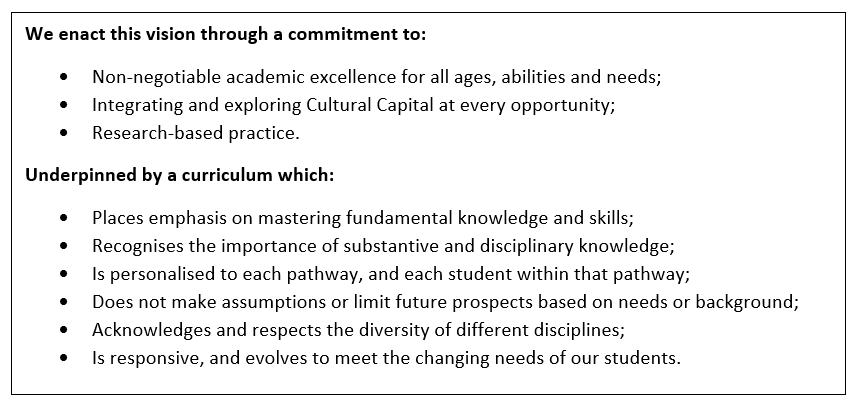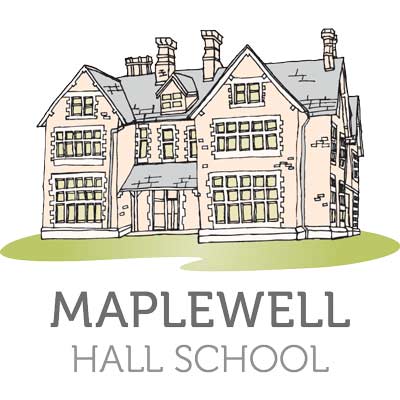
Curriculum Vision
The ultimate goal of the Maplewell curriculum is to achieve equity for our students, allowing them to compete with their peers for the very best academic and employment opportunities. Our curriculum is designed to empower students with knowledge beyond their own boundaries, exposing them to a wide range of arts, literature, sports, mathematical concepts, scientific theories and much, much more that they would otherwise be unlikely to encounter in their daily lives. At Maplewell, we disrupt and challenge the status quo through a shared understanding that an exceptional education is intrinsically linked with social mobility.
In our curriculum, we tirelessly challenge stereotypes and prejudices, not only through its diverse content, but also in our aspirations for our students. We firmly believe that knowledge is power; with a curriculum rich in knowledge, and with exceptional teaching, additional needs need not be a barrier to achieving academic excellence at any stage. We do not limit our students’ experiences and we do not make assumptions about their future prospects based solely on additional needs or background. We are committed to offering a vast range of knowledge and experiences which will allow students to make their own realistic choices about their future. The world of work is rapidly changing for the better to support people with additional needs to access a full range of meaningful employment, and our aspirations for our students reflect this.
It is our aim that, no matter their starting point or additional needs, our students leave us as resilient, confident and articulate individuals, who are equipped with the knowledge and understanding to become critical thinkers who can successfully navigate aspects of adulthood.

A Broad, Balanced and Knowledge-Rich Curriculum
Our research-based, knowledge-rich curriculum model is simple; in each Pathway, at each Key Stage, we teach to master knowledge and skills, starting with the basics and building upwards.
We wholly subscribe to the principle that ‘the limits of my language mean the limits of my world’ (Wittgenstein). Therefore, explicit teaching of Tier 2 and 3 vocabulary underpins our whole curriculum and is meticulously planned in each scheme of work for every subject at every level.
Our Curriculum Cornerstones are our ‘non-negotiables’:
- Reading
- Literacy
- Numeracy
- Preparation for Adulthood
Through these, we teach the skills and knowledge which allow access to a full curriculum. Our Curriculum Cornerstones are the building blocks of becoming a healthy, well-informed and well-rounded young adult.
Next, our Core offer; the compulsory subjects which build on the skills and knowledge of our Curriculum Cornerstones. Through the carefully planned English, Maths and Science Curricula, expert teachers nurture an interest in gaining subject-specific knowledge, interwoven with opportunities to build cultural capital.
Our Foundation subjects allow students to develop knowledge in a range of disciplines outside the Core, further building cultural capital and honing individual strengths and personal interests which shape future outcomes. Foundation subjects take knowledge beyond students’ own experiences and providing diverse perspectives on the world. Some lead to an academic qualification at KS4; all are designed to inspire students to consider the discipline for further study towards a viable and rewarding career.
After mastering a diverse range of knowledge in KS3 Foundation subjects, our Option subjects offer students independent choice about their academic career at KS4 and 5, further mastering subject knowledge and leading to an academic qualification. Options allow students to begin to ‘specialise’ in an area, forming the basis for their next academic or vocational steps.
Finally, at the top of our hierarchy of knowledge, our Enrichment and extracurricular choices evolve to offer students the very best opportunities to further develop their cultural capital. These enhance our curriculum offer, allowing students the independence to choose their own opportunities to meet gaps in their knowledge, be inspired by something new or make an active contribution to the school community.
Throughout our curriculum, we promote meaningful interdisciplinarity to strengthen schemas of knowledge for pupils, allowing them to use knowledge and skills across a range of subjects to promote depth of understanding and retention.
Three flexible Pathways are offered to meet the needs of all our learners:
Curriculum Model
We run a one-week timetable based on five periods a day of fifty minutes each, totalling twenty-four periods each week. Many of these are double lessons, for example in PE, Technology and in Option subjects in Years 10 and 11. A 35-minute dedicated Reading lesson takes place each day. Numeracy and a weekly review of EHCP targets take place during tutor times.
A higher than average share of curriculum time is allocated to English and Maths throughout Key Stage 3 and 4 to address EHCP targets and recognise the importance of success and progress in these core subjects.
On Monday, Wednesday and Thursday school provides after school activity clubs and academic intervention (Maths, English and Science).
The Key Stage 3 and Key Stage 4 curriculum content is outlined in the new national curriculum which can be found on the DFE website: National Curriculum
Pupils in Key Stage 4 follow GCSE, Entry Level, BTEC and a range of Vocational courses offered by different awarding bodies.
In core subjects, pupils work in classes set by ability, and in mixed ability classes for foundation subjects, dependent on the subject and stage at which it is being studied. Information about individual subject curricula can be found here.
Personal Development
Pupils in all Key Stages have two lessons a week of Preparation for Adulthood (P4A). This covers statutory areas of Citizenship, Personal, Social and Health Education (PSHE) and Careers Studies. Within the subject students are taught Good Health; Employment; Independent Living; Friendship, Relationships and Community Inclusion. Key themes from these areas are also covered by all key stages on our Special Assemblies, Culture Day event, Science, Technology, Engineering, and Mathematics event (STEM) and Reward Days when the ordinary timetable is suspended to develop broader attributes such as leadership, organisation, initiative, resilience and communication.
A cross curricular focus on building cultural capital allows our pupils to become educated citizens through a broad, diverse, knowledge-based curriculum.
Career Education and Information Guidance (CEIG)
Careers education and information guidance is mapped out across all years 7-14. Careers advice ensures that the needs of all individual students are met. Our guidance ensures that students can:
achieve in line with expected outcome for their Key Stage by following an appropriate course;
access the GCSE subjects when appropriate and progress to facilitating subjects at higher level;
access a number of vocational options where appropriate, which will develop the skills required for the world of work.
